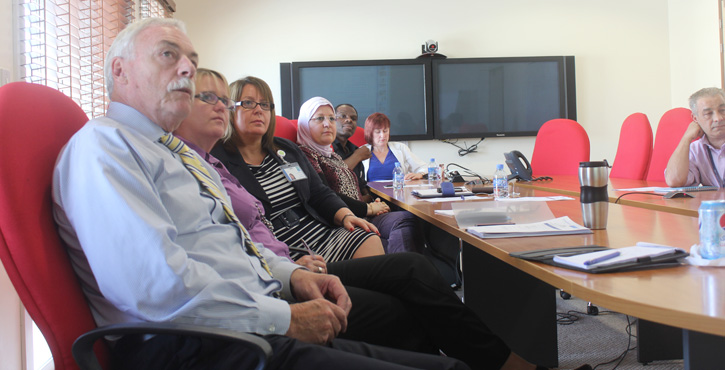
Since the Child and Adolescent Mental Health Stakeholders’ Workshop in January, 2012, the task force and its members have been hard at work to deliver the actions agreed. Over the course of the year, the task force has grown with the inclusion of many organizations in Doha that provide mental health services to children and young people. Organizations such as Al Aween Social Rehabilitation Centre, Qatar Foundation for Child and Woman’s Protection, School Health, Primary Healthcare Centre, Family Counseling Centre, Supreme Council of Health, Qatar Petroleum, Pediatric Emergency Centre Al-Saad, Qatar Military Psychiatric Department and HMC Pediatric Psychiatric Department are all represented on the task force. Their continued involvement, contribution, participation and collaboration with one another and the SMEs visiting from the Hospital for Sick Children, Toronto, have greatly impacted on the progress made to date.
One of the priorities identified at the initial workshop was to develop a prospectus of the current organizational structure and referral pathways, in an effort to better understand how different organizations are connected and interact. This exercise made it apparent that there is silo-working and that there is a lack of knowledge of the roles and niches of the various organizations encompassed within the current system. A major accomplishment was achieved by just having the various stakeholders sitting at the same table understanding their respective services and acknowledging how they were interrelated.
The engagement from all participants enabled another priority identified at the initial workshop to be addressed. The task force focused on restructuring and developing clinical guidelines, assessment and treatment protocols, and referral pathways. The objective behind this was simple – to reduce fragmentation and duplication of services; to facilitate collegiality and collaboration; and to create an organizational structure of the services that are easily accessible for the patients. The task force decided to focus this component of work on the most common diagnoses for children and adolescents. Dr. Umesh Jain, Child Psychiatrist from the Hospital for Sick Children-Toronto, facilitated this process, over the course of two, week-long visits, by creating multi-organizational teams for the specific diagnoses – autism spectrum disorders and developmental delays, anxiety disorders, mood/depression disorders, and disruptive behavior disorders. All participants collaborated to determine the same processes for complex and co-morbid cases, which was especially interesting as it provided the various stakeholders the opportunity to begin to work in a collegial and collaborative manner.
Another important outcome of the workshop was to assess the knowledge, practice and protocols of the nursing staff when adolescents were admitted into the inpatient unit at HMC. Elizabeth Ferguson, Najwa Al Shammasi and Joanne Bignell, from the Hospital for Sick Children-Toronto, came to visit and meet the staff. It proved a fruitful visit and they are currently developing a training/education curriculum, which will be a combination of didactic sessions, workshops and role play. They aim to deliver it to a selected cohort of the staff in January 2013. The SKI SME’s will work to implement a safety checklist and risk assessment protocol through the curriculum.
The last priority area agreed at the workshop was to create a physical and team identity for the service. Though this is challenging, the task force has made good progress. The HMC Psychiatric Department has proposed to use a separate facility for child and adolescent mental health outpatient services and day-programs. The task force has also started to develop a resource directory, which describes the clinical protocols and pathways, and provides brief descriptions of the organizations, the services offered and the point of contact. This is the first time a resource like this has been developed.
The work to date is based on continued collaboration and ingraining a sense of collegiality within a reformed organizational structure. Though the task force has made considerable headway towards instituting change, there is a lot of work to be done. The task force is organizing the 2nd Child and Adolescent Mental Health Stakeholders’ Workshop. This event will provide a forum to celebrate the achievements, identify obstacles and brainstorm solutions, and identify priorities for 2013.
